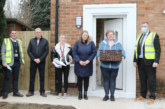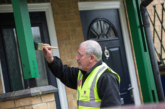
Simon Wilson, National Sales Manager for ASSA CLIQ Remote, outlines how local authorities can save time and money by improving security and key management of void properties.
According to the Department for Communities and Local Government, housing associations and local authorities own 5m homes in the UK. Around 610,000 of these homes are empty, accounting for more than 12% of total stock. This has huge implications for councils, including loss of rental income, increased potential for crime and other security threats, as well as missed opportunities for would-be tenants to take advantage of safe and secure housing.
In the social housing sector, the pressure to re-let houses as quickly as possible should not be underestimated. Nevertheless, properties will inevitably stand vacant between tenancies, while the necessary service and maintenance checks are carried out. Re-let times are costly for local authorities, both in terms of time and money, and any steps that can speed up this process are encouraged. Empty buildings may not seem to pose much of a security risk, yet crimes against void properties are on the increase. These can impact when a new tenant can take up residence, costing the local authority further time and money.
Key issues
Service and maintenance teams will typically rely on one set of keys for every void property. This is extremely impractical, causing inevitable delays to repairs and holding up potential new tenants from moving into a property. With workers passing keys between each other, the opportunity for them to be lost or misplaced is greater. This poses a potential security risk for the void properties.
Nationally, crime against empty properties is also on the increase, partly due to the rising value of metal. Indeed, there has always been a level of risk associated with void properties, including theft, arson and vandalism. Vacant Property Specialists estimates that squatting poses a risk for typically one in ten property managers in the UK. As a result, local authorities require a solution that saves time and money, while offering peace of mind against potential security threats.

An assured solution
To help local authorities overcome these issues with void properties, ASSA CLIQ Remote has been developed to provide an intelligent security locking system that delivers efficient key management, while protecting against potential security risks. The technology recently won the title of ‘Most Innovative New Product’ at the 2017 Housing Innovation Awards, in recognition of how it is helping transform access control and effective key management in the social housing sector.
It is, crucially, a wireless system, which allows housing organisations to give key holders — regardless of location — remote access to a property. Each key can be programmed and updated individually. This means key holders have access only to the areas relevant to them, during their allocated time or dates. Each relevant member of staff carries their own programmable remote key. Using online management software, it is possible for a council to issue timed permissions to enter specific void properties at any one time, with the added benefit that these access rights can be amended or revoked instantly. This can be particularly useful if out-of-hours contractors are involved, as keys can be programmed to work for a limited time only.
Managed using online software, this system makes it simpler to control access rights, enable or disable keys and customise access schedules, whether on site or on the go. The solution improves efficiencies by offering a greater key management solution, while providing assured security and protecting unoccupied properties, ensuring budgets can be used more efficiently.
Improving cost efficiency
One example of how the technology has impacted on the market is with Rotherham Metropolitan Borough Council (RMBC) — the project that helped it win its recent Housing Innovation Award. With approximately 2,000 empty properties to manage every year, RMBC needed a security solution that would improve its key management system, deliver greater access control and save vital costs, while protecting assets from potential security risks.

Since implementing ASSA CLIQ Remote, the system has dramatically changed the council’s working practices, while delivering secure access control for its many void properties. The new system utilises wireless technology to give key holders — regardless of location — remote access to a property. Each member of staff across RMBC’s voids department can have a single key to access all the properties they need and permissions can be altered at any time. The technology also provides a full audit trail, and features such as time limits on access control ensure security is optimised.
The system is saving staff approximately 40 hours of time every week, while delivering an additional £60,000 a year to RMBC in rent and council tax from tenants in properties that would have otherwise remained empty for longer. This innovation is transforming the way access control and key management is administered, offering an assured security solution.
Councillor Dominic Beck, Cabinet Member for Housing for RMBC, explained: “We wanted to make sure that people who needed to get access to our properties could do so as quickly as possible and ensure our repair procedures remain robust but as efficient as possible. A traditional key approach only added to delays. The ASSA CLIQ Remote system speeded up our operations and made sure that we could be more confident about the security of our properties.”
John O’Brien, Director of Innovation at the Building Research Establishment Innovation Park, one of the judges at the 2017 Housing Innovation Awards, added: “We found ASSA’s innovation gave housing associations more control over their void properties, reduced costs in repeated visits and allowed them to control the whole process. Another area that the judges were particularly excited about is extending the product to provide access for care workers and addressing health issues such as dementia.”








